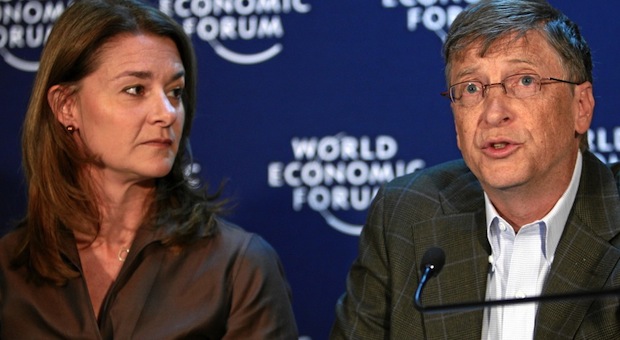
A U.K.-based campaign group Global Justice Now have just released a report which says the Bill & Melinda Gates Foundation is funding strategies that promote multinational corporate interests at the expense of social and economic justice.
The activists for social-justice accuse the Microsoft billionaire of distorting global-development priorities through the immense wealth and influence of his Seattle-based foundation.

BYPASS THE CENSORS
Sign up to get unfiltered news delivered straight to your inbox.
You can unsubscribe any time. By subscribing you agree to our Terms of Use
Latest Video
The Seattle Times reports:
With assets of $44 billion, the Bill & Melinda Gates Foundation is not only the world’s biggest philanthropy, but it also spends more on international aid and global-health programs than most nations.
That financial clout gives the foundation an outsized role in shaping global-health and agriculture programs, says a new report titled “Gated Development: Is the Gates Foundation always a force for good?”
Yet the foundation’s emphasis on vaccines, technological solutions and specific diseases undermines support for basic health systems in poor nations, argues the report’s publisher, Global Justice Now, a U.K. group with 60,000 members that advocates for more just policies around trade, food and energy. At the same time, the foundation both invests in and collaborates with pharmaceutical and agricultural corporations, creating “a corporate merry-go-round where the (foundation) consistently acts in the interests of corporations,” the report says.
“The world is being sold a myth that private philanthropy holds many of the solutions to the world’s problems, when in fact it is pushing the world in many wrong directions,” the report adds.
In a written response, the Gates Foundation said the report “misrepresents the foundation, our work and our partnerships.”
In order to improve the quality of life for the world’s poorest people, government, NGOs and for-profit companies must collaborate, the response says.
“The private sector has access to innovations — for example, in science, medicine and technology — that can save lives. And we believe that the role of philanthropy is to take risks where others can’t or won’t,” the foundation said.
The foundation also pointed out that its staff has no control over the finances and investments of the Gates Foundation Trust.
The U.K. report is the first to assemble in one document the entire litany of concerns raised about the Gates Foundation, from alarm over its funding of genetically modified crops in Africa to criticism of its support for charter schools in the United States.
“By collecting all this information and analyses in one place, we hope to make it easier for other actors to challenge the Gates Foundation’s approach to aid work,” said Polly Jones, head of campaigns and policy for Global Justice Now.
Criticism of the foundation is stifled, simply because it funds so many NGOs, universities and media organizations, Jones pointed out.
“We were surprised at how few critical voices there were, which made us want to dig further.”
(The Seattle Times receives a Gates Foundation grant to help fund Education Lab, a Times’ project that spotlights promising approaches to persistent challenges in public education.)
While governments must answer to their citizens and demonstrate the effectiveness of international-aid programs, the Gates Foundation enjoys unprecedented power with no accountability, Jones added.
“Just because you have a lot of money, and you’re being generous in giving some of it away, is that enough to allow you to influence global health and agriculture policies?” she asked.
In Africa, for example, the foundation is promoting a more industrialized version of agriculture, where small farmers might boost their harvests by using fertilizer and high-tech seeds. But given the cost of those seeds and chemicals, it’s not clear whether the farmers themselves will benefit, or just the businesses involved.
“You don’t change a system by providing somebody with a smartphone or climate-resistant crop,” Jones said. “Creating a more just system requires more than a technological fix.”
The group is calling for an independent, international evaluation of the Gates Foundation by the Organisation for Economic Cooperation and Development (OECD), as well as an inquiry by the U.K. government into the relationship between that country’s development arm and the foundation.
However, the Paris-based OECD has no authority over the Gates Foundation.


